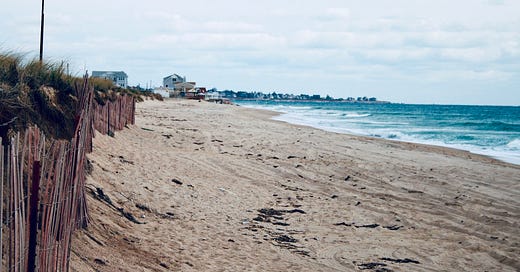Save The Bay and Attorney General Neronha once again press for CRMC reforms
“The CRMC’s lack of accountability in how it arbitrarily enforces its own rules erodes the public’s trust in CRMC, hampering the agency’s ability to effectively protect our coastal resources.”
From Save The Bay and Rhode Island Attorney General press releases:
Save The Bay applauded the Rhode Island Superior Court’s decision in The Dumplings Assoc. v. CRMC as another check on “the politically appointed Coastal Resources Management Council (CRMC)’s unacceptable abuse of discretion and disregard for proper procedure and fairness.” The Rhode Island Superior Court ruled last week that the CRMC approved a marina expansion and dredging project in Jamestown without complying with the CRMC’s rules and procedures.
“The Council’s lack of accountability in how it arbitrarily enforces its own rules erodes the public’s trust in CRMC, hampering the agency’s ability to protect our coastal resources effectively,” said Topher Hamblett, executive director of Save The Bay. “Additionally, repeated judicial reversals or remands of flawed Council decisions cost the State time and money, creating a lack of confidence in CRMC. It’s time for the General Assembly to reform our coastal agency by passing legislation to remove the Council and provide a full-time staff attorney to ensure the agency abides by the rules.”
The Dumplings Assoc. v. CRMC case is another example of Rhode Island courts remanding a decision by the politically appointed CRMC Council due to the Council’s persistent misapplication and legally incorrect interpretation of its own rules, writes Save The Bay in a press release. Save The Bay agrees with the Court that it defies logic that CRMC’s Council doesn’t understand or correctly apply its rules. The Council’s inconsistent and faulty application of its rules is arbitrary, creates unpredictable results, and furthers the appearance that the Council lacks impartiality in coastal cases.
Save The Bay continues:
“Rhode Island courts have repeatedly admonished the Council for its failure to know, understand, and evenly apply its rules. In overturning the Council’s unlawful actions in the Champlin’s Marina case in 2022, the Rhode Island Supreme Court pointed to the Council’s obligation to engage in “an open, traceable decision-making process [which] is essential for an effective coastal management program.” This admonition followed after the Court’s 2010 decision on the same contested marina permitting case where the Rhode Island Supreme Court noted the importance of preserving “the public’s trust in the integrity of the administrative process.” Fair and accurate interpretation and trusted administration of our coastal laws are essential to the protection of our State’s coastal resources.
“However, despite repeated rejections and remands of deficient Council decisions by Rhode Island courts, there have been no consequences for the Council’s breach of the public’s trust or its mandates to protect the State’s coastal resources. There have been no administrative or legislative inquiries, no new training for Council members, and no new procedures or policies to prevent future breaches of due process or public trust. In fact, the structure of the Council itself lacks transparency and invites abuse.
“The Council is failing Narragansett Bay, our coast, and the people of Rhode Island. The Council's misapplication of CRMC’s rules results in costly delays and uncertainty for applicants and jeopardizes the consistent and fair implementation of the state’s coastal program. The wellbeing of Narragansett Bay, the economy, and the people who depend on it deserve better.”
Attorney General Peter Neronha issued the following statement following yesterday’s decision by the Coastal Resource Management Council (CRMC) to deny Quidnessett Country Club’s petition to reclassify abutting waters.
“Of course, I am pleased that the CRMC ultimately rejected Quidnessett’s request, but regardless, we need reform, and we need it now,” said Attorney General Neronha. “The fact that the Council even considered this request, a retroactive plea for relief from the consequences of their blatantly illegal action, tells you everything you need to know about the state of environmental oversight in Rhode Island. When Quidnessett decided to build an illegal seawall on protected waters, they either thought they wouldn’t get caught or they thought that if they did get caught, they wouldn’t be held accountable. Neither scenario is acceptable, and both scenarios are a product of the Council’s well-earned reputation.
“Yesterday, my Office again submitted legislation to create a Department of Coastal Resources, which would establish a dedicated agency with the organization and expertise necessary to handle complex permitting and enforcement issues,” continued Attorney General Neronha. “If taken up and passed into law, the Department would bring careful consideration to all decisions affecting Rhode Island’s coastal resources, and long gone would be the days of reckless environmental action with delayed, or without, consequences. If we are serious about protecting our most treasured natural resources, we must confront this problem head-on, and a new Department of Coastal Resources is the only fix.
“Rhode Islanders rely on the coast, in part, to support their social and economic wellbeing, and because this is so, they cannot rely on the Council. Because while the Quidnessett decision ultimately came down in our favor, it’s only a matter of time before the next Quidnessett. We must embrace real and lasting reform before it’s too late. And the solution is a dedicated Department with no agenda beyond acting in the best interest of Rhode Islanders and the environment.”
See also:




CRMC should be abolished and any member who went along with any of the behind the scenes deals should be prosecuted.